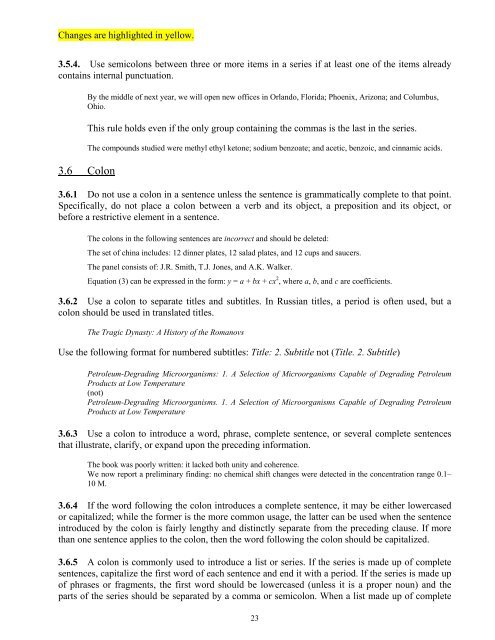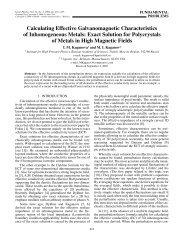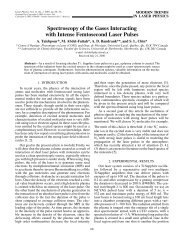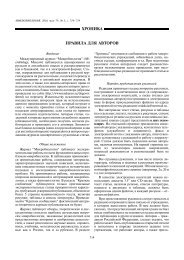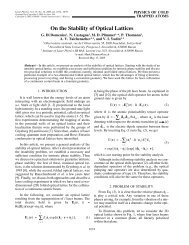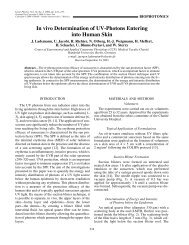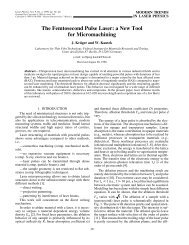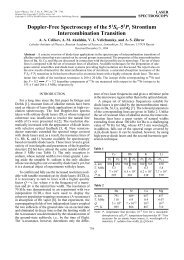House Style Guide 2011 - MAIK "Nauka/Interperiodica"
House Style Guide 2011 - MAIK "Nauka/Interperiodica"
House Style Guide 2011 - MAIK "Nauka/Interperiodica"
- TAGS
- maik
- www.maik.ru
You also want an ePaper? Increase the reach of your titles
YUMPU automatically turns print PDFs into web optimized ePapers that Google loves.
Changes are highlighted in yellow.<br />
3.5.4. Use semicolons between three or more items in a series if at least one of the items already<br />
contains internal punctuation.<br />
By the middle of next year, we will open new offices in Orlando, Florida; Phoenix, Arizona; and Columbus,<br />
Ohio.<br />
3.6 Colon<br />
This rule holds even if the only group containing the commas is the last in the series.<br />
The compounds studied were methyl ethyl ketone; sodium benzoate; and acetic, benzoic, and cinnamic acids.<br />
3.6.1 Do not use a colon in a sentence unless the sentence is grammatically complete to that point.<br />
Specifically, do not place a colon between a verb and its object, a preposition and its object, or<br />
before a restrictive element in a sentence.<br />
The colons in the following sentences are incorrect and should be deleted:<br />
The set of china includes: 12 dinner plates, 12 salad plates, and 12 cups and saucers.<br />
The panel consists of: J.R. Smith, T.J. Jones, and A.K. Walker.<br />
Equation (3) can be expressed in the form: y = a + bx + cx 2 , where a, b, and c are coefficients.<br />
3.6.2 Use a colon to separate titles and subtitles. In Russian titles, a period is often used, but a<br />
colon should be used in translated titles.<br />
The Tragic Dynasty: A History of the Romanovs<br />
Use the following format for numbered subtitles: Title: 2. Subtitle not (Title. 2. Subtitle)<br />
Petroleum-Degrading Microorganisms: 1. A Selection of Microorganisms Capable of Degrading Petroleum<br />
Products at Low Temperature<br />
(not)<br />
Petroleum-Degrading Microorganisms. 1. A Selection of Microorganisms Capable of Degrading Petroleum<br />
Products at Low Temperature<br />
3.6.3 Use a colon to introduce a word, phrase, complete sentence, or several complete sentences<br />
that illustrate, clarify, or expand upon the preceding information.<br />
The book was poorly written: it lacked both unity and coherence.<br />
We now report a preliminary finding: no chemical shift changes were detected in the concentration range 0.1–<br />
10 M.<br />
3.6.4 If the word following the colon introduces a complete sentence, it may be either lowercased<br />
or capitalized; while the former is the more common usage, the latter can be used when the sentence<br />
introduced by the colon is fairly lengthy and distinctly separate from the preceding clause. If more<br />
than one sentence applies to the colon, then the word following the colon should be capitalized.<br />
3.6.5 A colon is commonly used to introduce a list or series. If the series is made up of complete<br />
sentences, capitalize the first word of each sentence and end it with a period. If the series is made up<br />
of phrases or fragments, the first word should be lowercased (unless it is a proper noun) and the<br />
parts of the series should be separated by a comma or semicolon. When a list made up of complete<br />
23


